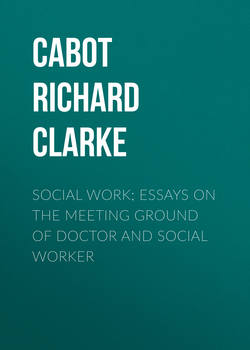Читать книгу Social Work; Essays on the Meeting Ground of Doctor and Social Worker - Cabot Richard Clarke - Страница 4
PART I
Medical-Social Diagnosis
CHAPTER II
HISTORY-TAKING BY THE SOCIAL ASSISTANT
ОглавлениеHistory-taking concerns the social assistant especially because history-taking is one of the things one does, if one is wise, in any matter in which one is trying to help a human being. Even if you were concerned to help not a stranger, but a member of your own family, still you would need a story or history of the person's life whether you wrote it down or not.
History and catastrophe
In our attempts to be of use to people in their misfortunes, there are two very common and quite opposite points of view (roughly the right and the wrong), which I call (a) the "historic" and (b) the "catastrophic," the accidental, or the emergency point of view.
Confronted with people's troubles, whether physical or mental or spiritual, we are tempted, and above all they are tempted to regard the sickness, the poverty, or the sorrow in the light of an emergency, an accident, and therefore as something to be treated at once and by means which have little to do with the past and the future. On the other hand, the standpoint of science and philosophy, and of any one who has labored long in the field of social work with or without science or philosophy, is the point of view of history. This is the habit of mind which makes us believe that a supposed "accident" belongs in a long sequence, a long chain of events, so that it is impossible to understand or to help it without knowledge, as extensive as our time and our wisdom will allow, of that whole chain.
Consider a few examples which contrast these two points of view. When a boy is brought into court for stealing, it is almost always his attempt, and the attempt of those who defend him, to show that such a thing has never happened in his life before; he "just happened to steal." But as we inquire more closely into the facts, we almost always find that this is a fundamentally untrue statement of the case. For the offence which brought him into court is almost never the first offence. He has always stolen before. On the present occasion he was a member of a boy's gang; it was not in the least accidental that he got into that group of boys. As we search back in his history, and perhaps into his father's history, we find reasons why he is what he is now. Again, we are trying to help some wayward girl who has taken an immoral step. We are told what a wholly unforeseeable accident it was that got her into her trouble. But if we can get a good picture of her past, we find that we could have traced the tendency to weakness of this kind from the time she was born.
So it is in medical matters. Emergencies are rare. I remember being called out of a sound sleep one night to go "as quickly as possible" to see a man who had discovered a lump upon his breast bone. He was quite sure that the swelling had appeared since the time when he went to bed. It was then one o'clock in the morning, and he had gone to bed at eleven. Well, I found a slight bony irregularity in his breast bone which doubtless had been there about forty-five years, as he was forty-six years old. He did not pretend that it hurt him, and did not undertake to show that he was ill in any other way. But this lump had come and naturally he wanted help at once.
